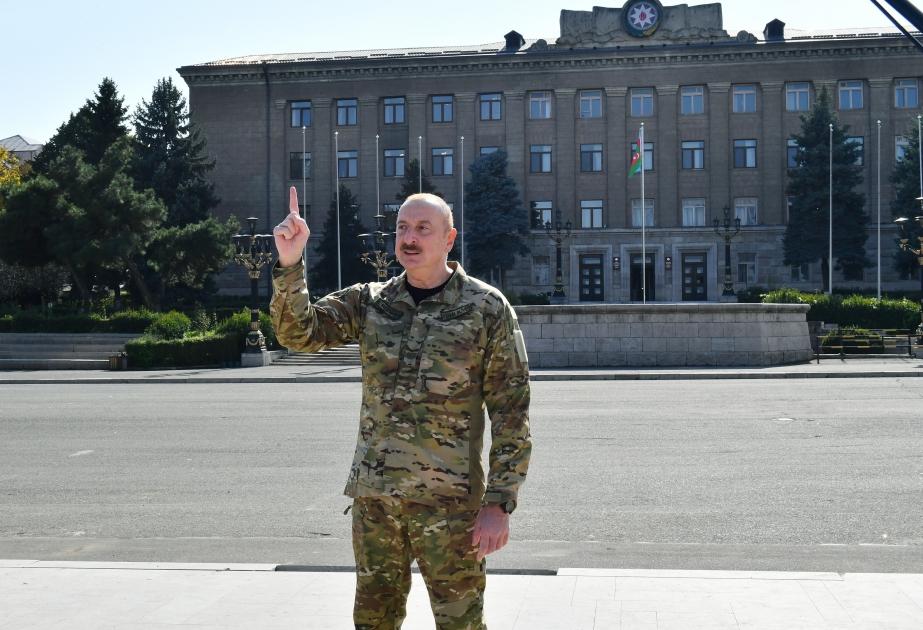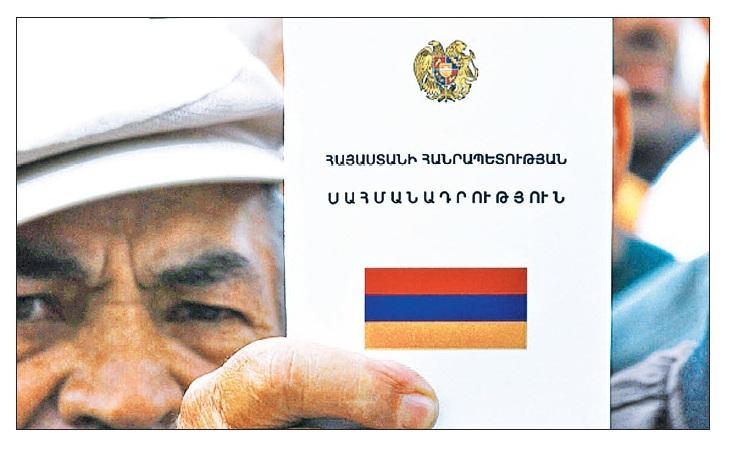Armenia lost in the labyrinth of its constitution imbued with "miatsum" ideas Theseus must kill the Minotaur
For the first time in a while, the latest developments in the Armenian-Azerbaijani settlement give reason to hope for the signing of a peace treaty between the countries shortly. In general, it is quite within reason to suggest that Pashinyan's attempts to delay and disrupt the negotiation process were rather aimed at the gradual adaptation of Armenian society to peace with Azerbaijan. This is confirmed by the fact that from time to time the Prime Minister has raised the issue of the relevance and expediency of the basic points of Armenian identity.
There is no doubt that if there is a force in Armenia that is contemplating a revolution in public consciousness, including concerning its neighbours, it is Pashinyan's party. By the will of fate and the Armenian people, this party has come to power. The conclusion follows that the Armenian people, with all the accompanying hesitations, are ready to change the paradigm of hostility towards Azerbaijan.
As long as there was an occupation of Karabakh, "miatsum" tickled the vanity of even those Armenians who did not embrace the nationalist idea. Knowing in their hearts that they had bitten off a piece they couldn't digest, they hoped that somehow it would work out, that they would slip through. They did not. Azerbaijan wouldn't help Armenia slip through. Instead, our country did a no less noble service to the Armenian people - by force of arms, it helped them get rid of their heavy burden.

The Azerbaijani soldier put an end to thirty years of slumber and brought Armenians to reality.
The puppet regime in Karabakh was forced to adopt a document on self-dissolution. Perhaps, sober-minded Armenians calmly exhaled from this news, saying that there is no "Artsakh", no problems. However, this is a deceptive feeling. The ignominious end of the junta does not absolve Armenia of responsibility for the occupation, but on the contrary, exposes it in all its unsightliness. The self-dissolution of the regime served the purpose of depriving any third party or international organisation of even the hypothetical possibility of referring to the "NKR" as a subject of international law in the future. We have thus killed the sympathy for the implementation of the "miatsum" on Azerbaijani soil. For Azerbaijan, this is good news. However, for Armenia and its citizens, on the contrary, the problem of personal and public attitudes towards the occupation of Karabakh is aggravated with new vigour. The fact is that with the self-dissolution of the puppet entity, the conflict has lost its superficial dimension and returned to its foundation - Armenia's territorial claims against Azerbaijan. After all, according to the Armenian constitution, Karabakh, or rather the former NKAO, is part of Armenia.
The preamble of Armenia's Constitution states: "The Armenian people, taking as a basis the fundamental principles of Armenian statehood and the nationwide goals enshrined in the Declaration of Independence of Armenia...adopts the Constitution of the Republic of Armenia". That is, the basic law of the Republic of Armenia refers to the Declaration of Independence. The Declaration of Independence, in turn, says the following: "Expressing the united will of the people of Armenia... implementing the right of nations to free self-determination, based on the joint Resolution of the Supreme Council of the Armenian SSR and the National Council of Nagorno-Karabakh of 1 December 1989 'On the Reunification of the Armenian SSR and Nagorno-Karabakh'... proclaims the beginning of the process of establishing independent statehood".
For Armenian jurists, including the Constitutional Court judges who review laws to see if they conform to the Constitution, Karabakh is part of Armenia. That means the peace treaty that Pashinyan is likely to sign with Azerbaijan will contradict the Armenian Constitution. Even if it is ratified by the parliament, the lawsuit about its compliance with the Constitution will be sent to the Constitutional Court, and the latter will have no choice but to declare the treaty invalid. All members of the panel will be forced to accept such a verdict, even if they are personally opposed to the "miatsum". Mass protests are not even necessary for that arrangement since everything will be decided on the legal plane. Pashinyan (or anyone else who will succeed him in this post) will then shrug his shoulders. The Constitution does not allow it, that's all.
It turns out to be an interesting mishap: if Armenia used to occupy Karabakh, now Karabakh is occupying Armenia. The latter needs freedom. Freedom from occupation, freedom from Karabakh. In the physical sense, we have given her this freedom. Now it has to earn it mentally and constitutionally.
Mass protests, or rather their scale, or on the contrary, their complete absence, will still matter. In the sense that they will allow us to understand whether it will be possible for Pashinyan to take the last and most responsible step - to initiate a change in the Constitution or not. The fewer protests there are, the more likely it is that Pashinyan will take this step.
And one more reservation should be made here. The relevant paragraphs of the Declaration of Independence and the Constitution are so interconnected and interdependent that I fear that simply removing the reference to the Declaration from the Constitution will not solve the matter. It is quite likely that to end the legal conflict it is necessary to include in the Constitution a text prohibiting in one way or another the very idea of "miatsum". But let's leave these problems to the Armenian lawyers. We are sure that if there is a will, they will be able to find the right solution.
By the way, one such solution could be not to change the current Constitution, but to adopt a new Constitution, in which the new point of reference would be not the Declaration of Independence, but peace with Azerbaijan (this, of course, can be not prescribed, but implied). The current Constitution is simply imbued with the ideas of "miatsum". This idea has led Armenians to collapse, which means that the Armenian people need a fresh breath of air, i.e. a new Constitution.
If we try to look at the root, the point of the 2018 revolution was to change the Constitution. Pashinyan, having swept the Karabakh clan off the throne, actually fulfilled the role of the mythical Theseus, who killed the Minotaur. However, having fulfilled this mission, he, without a ball of thread, cannot get out of the labyrinth and is wandering in it, wringing his hands in mixed feelings of euphoria and fear. The task of Armenians is to rescue their leader (and themselves) from the labyrinth, for this purpose it is necessary to complete what has been started - not only to kill the monster but also to destroy the labyrinth. The country needs a new Constitution. Without it, the revolution of 2018 will have no meaning. The new Constitution will establish a new milestone, legitimise it in consciousness and give society new strength to fight the reaction of the revanchist camp.

As already noted, this is only the most optimistic scenario. The resistance to Pashinyan may be too serious to successfully advance the "Constitution 2.0" operation.
Does this mean that there is no need to sign a peace treaty with Armenia? Quite clearly, no. A treaty is necessary in any case. Signing a peace treaty would serve as a powerful blow to the load-bearing wall of the Armenian labyrinth. To understand the advantages of such a step, one should mentally compare the situation where there is no treaty and the one where there is one. If there is no treaty, then from the point of view of Armenian law Karabakh is considered an "occupied territory of Armenia", which means that sooner or later the immediate ideology of Armenians will be revanchism. If there is a treaty, then, although Karabakh will still be considered Armenian territory under the Armenian Constitution, this time there will be a conflict between the basic law and the will of the people expressed through the parliament elected by them. And this is already a legitimate trigger for challenging the validity of the current Constitution, even if not now, but in a year, two or five years. A peace treaty sanctified by the blessing of the people undermines the legitimacy of the Constitution. Which means the Constitution must be changed.
By the way, the best way to prove to the Armenians that the current Basic Law is worthless is to point out to them the fact that they have never lived under it, and therefore it is zero. After all, if they had lived under the Constitution, they would not have tolerated the puppet regime of the "NKR" on "their" territory. Yerevan, following the Constitution, should have declared the "NKR" null and void and arrested the leaders of the regime.
The declaration of the "NKR" was intended to shroud the blatant fact of occupation, not only of the territory of the former NKAO but also of seven surrounding districts, in the veil of the struggle for "self-determination". That is, Armenia did not recognise the "NKR" on the one hand, fearing the reaction of the international community, and on the other hand, being bound by the Constitution, which declared the former NKAO to be the territory of Armenia. At the same time, Armenia thus "covered" the occupation of seven districts, which according to the Armenian Constitution did not belong to it.
The international community, while not recognising this state of affairs in words, in fact, condoned this legal lawlessness in every possible way. This support nurtured a sense of impunity in the Armenian people. Azerbaijan, through the power of its righteousness, intellect and weapons, has led to the elimination of the gap between international law and reality and, consequently, the cognitive dissonance of the international community. Now it is the turn of Armenians to realise this new reality. Armenians must now realise that all this sordid internal and deeply provincial legal baloney is a heavy karmic yoke on their souls.
After the signing of the peace treaty (which is only a matter of time), the Armenian people will be faced with a choice of whether to accept the new basic law or to live in the old way. This dilemma can be rephrased differently - resurrection or decay?








